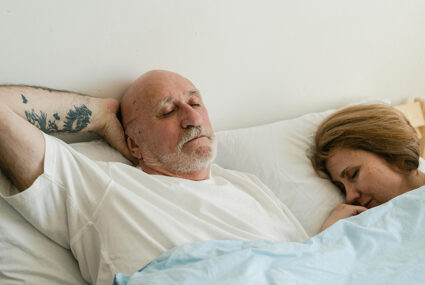As we age, sleep can sometimes become illusive. Not only do we miss out on feeling well-rested, but the cumulative effects of a sleeplessness can be bad for our overall health.
According to the National Institutes of Health in the USA, too little sleep causes increased anxiety, slows thinking, learning and reaction time and increases the risk of depression. In addition, lack of sleep can increase the chances of obesity and the risk of diabetes.
Here are seven tools, tips and tricks to help you get a better night’s sleep.
WHITE & PINK NOISE
Pink noise—like the humming of an air conditioner—may help you fall asleep faster and sleep more deeply. White noise—like the sound of running water—is effective for blocking sound, inducing relaxation and even treating tinnitus. Invest in a stand-alone noise machine, or use YouTube or Spotify playlists. If you have an iPhone, it includes a Background Sounds option.
AVOID CHOCOLATE, ALCOHOL AND CAFFEINE BEFORE BED
Commit to a three-hour window of time where you avoid stimulants before bedtime. Not only will your sleep improve, but chances are your overall health will improve when you say no to these three.
BLACKOUT CURTAINS & MOTION SENSOR NIGHTLIGHTS
Limiting the light in your room will allow your sleep cycle to run undisrupted and increase your opportunity for a night of deep sleep. They can both be purchased at your favourite all-purpose store.
CONSISTENT NIGHT TIME ROUTINE
Train yourself for a good night’s sleep. Your routine should involve turning off screens an hour before bedtime. Take time to engage your senses in relaxation: a warm shower, lavender essential oils, mindfulness exercises, and light stretching can all contribute to setting you up for a restful night.
CONNECT WITH NATURE WHILE YOU’RE AWAKE
Humans have a deeply ingrained and intuitive affinity for nature imprinted into our DNA. And natural light is essential for our bodies’ rhythms. The benefits of being outdoors will trickle down to your nighttime activities and help you sleep better.
NOSE STRIPS OR CPAP MACHINE
Snoring can have serious physical implications for your body and your relationships! Correcting your snoring could be as simple as over-the-counter nose strips to widen your nasal passage or as complex as a CPAP machine to treat sleep apnea. Consult your doctor if your snoring is interfering with your sleep cycle.
CONSISTENT WAKE & SLEEP TIMES
Waking up and going to sleep at the same time each day trains your circadian rhythm and can give you some control over your biological clock. A consistent wake-up routine will help your body and brain recover without needing extra hours of sleep.
Sleep is an important aspect of the physical dimension of wellness, which one of the International Council of Active Aging’s Seven Dimensions of Wellness.

Comments